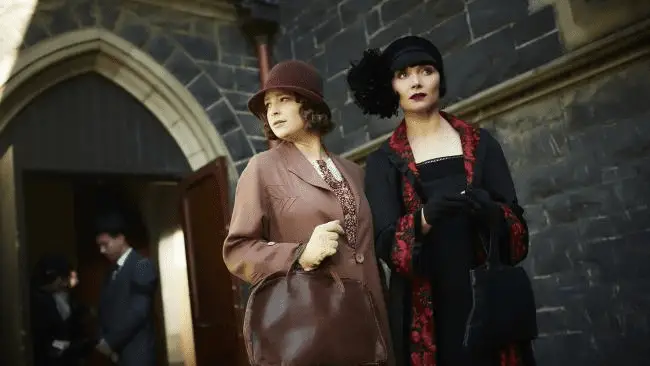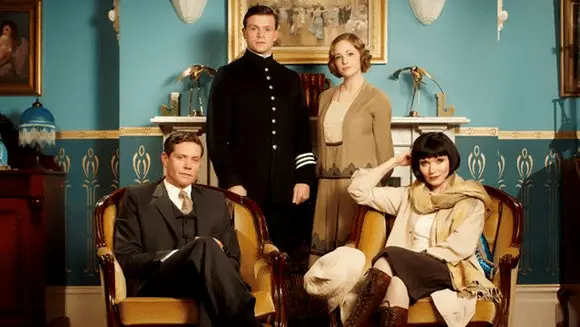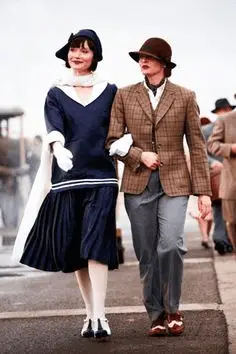As crime series go, Miss Fisher’s Murder Mysteries is both charming and refreshing. The setting is unusual, the characters strong in the real way, and the mysteries themselves often approach topics most shows would be uncomfortable handling. It also have a strong feminist perspective that I deeply appreciate.
The series is set in late 1920’s Melbourne, in itself a place and period unusual for a crime series. The bright and colorful 20’s aesthetics gives everything a levity and charm that balances out the gruesome murders.
Miss Fisher Herself
Our protagonist is Miss Phryne Fisher, a well-travelled woman in her forties. Impeccably dressed and fluent in several languages, Miss Fisher also knows how to fly and do judo and is on first name basis with most of Melbourne’s high society and art crowd.

She was never married and has no intention to change that. Instead, she prefers having casual affairs. It sometimes feels as if she goes through lovers faster than James Bond, which is a welcome change. It’s not often we get female protagonists who have casual sex without being shamed for it.
In the show’s current settting, she and her family are wealthy, yet this was not always the case.Miss Fisher also served as a field nurse during World War 1 prior to her family coming into money. In flashbacks, we see her and her younger sister Janey dressed in simple clothes, playing in back alleys and sneaking into a circus.
It’s important to know that her sister Janey was abducted and murdered as a child. The perpetrator is behind bars, but to this day he has not confessed what he did. Her sister’s memory and the lack of resolution with her murderer haunt Miss Fisher after all these years.
After she returns to Melbourne from overseas, Phryne stumbles into, and solves, a murder mystery. This makes her decide to become a ‘Lady Detective’. So from then on, she and her merry group of friends and not-actually-family meddle in every murder they find, to the sorrow of the actual police. This is where the series begins.
Phryne herself is shown to be eccentric but charming.
Aunt Prudence: Why do you think you can just run off on your own?
Phryne: Because I’m carrying a gun. *pulls gun*
Aunt Prudence: Phryne!
Her casual sexual encounters are never treated as something negative. She does not fall into the beds of random men, they fall into hers and nobody criticizes her choice to sleep around. Even when she gets closer to police Inspector Jack Robinson later on, he is shown to be envious yet he never acts entitled to her affections.
As far as her acting as a detective, the police themselves initially object to Phryne’s involvement in their investigations. If that is because she is a woman or because she is a layman with a habit of removing evidence from crime scenes is not clear, but it’s probably a bit of both. Of course, in time her charm, intelligence, and delicate hand in dealing with personal matters win them over.
And a delicate hand is often needed, as Miss Fisher’s cases often concern topics other series would be uncomfortable dealing with. The exploitation of women, especially those of the lower classes, female sexuality, women’s health and family planning, religion (both Christian and Jewish), homosexuality, race and immigration, drugs and mental illness, all of these are addressed both as period appropriately and sensitively as possible. Her brand of feminism too is kept period appropriate and does not favor women who are empoweredTM over others.
The Secondary Characters
Case in point is Dorothy Williams, called Dot or Dotty, Miss Fisher’s maid and companion. In one scene in the show, Dot, a devout Catholic, and Mr. Butler discuss Dot’s priest’s disapproval of her relationship with a Protestant.
Mr. Butler: There must be something you can do to convince him that stepping out with a nice young man like Hugh Collins isn’t a sin. What would Miss Fisher do?
Dot: She’d probably make a big donation, or pull a gun on him. Though I don’t think that either of those things would even budge my priest.
Mr. Butler: You’re a woman with influence Dorothy, though you may not realize it.
Dot: How?
Mr. Butler: Well, you’re crucial to the success of the fete. If for some reason, you decided not to fulfill you commitments to the church, then I suspect you, along with your handicrafts, and mending and baking, would be sorely missed.
Dot: I would.
Dotty is a nice, pious, and at first slightly naïve Catholic woman. She objects to lying, trespassing, and sleeping around, all things her employer regularly indulges in. She usually prefers to spend her time baking, sewing or embroidering, yet can’t help enjoying the adventures Phryne regularly pulls her into. Despite all their differences the two women never judge each other and quickly become best friends.

Dot falls in love with police Constable Hugh Collins. He is the aforementioned protestant, which poses quite a problem for their blossoming relationship.
“Dear Lord, I beseech you to look after the little orphans and those with less than I and those without good health, and the zebra in the zoo, you know, the one with the gammy leg, and if after all that, Lord, you still have some time, perhaps… perhaps you should sent Mr. Collins some kind of sign, you know, to let him know you’re Catholic.”
Often it is Hugh who gives Phryne and Dot information and an opportunity to get involved in their cases. He works with Inspector Jack Robinson, a by-the-book policeman, who is currently getting a divorce. I appreciate that most of the time, the police are not shown as incompetent to make Phryne come off as smarter. They are merely bound by rules or lacking vital evidence, possibly because Phryne stole it from the crime scene or otherwise broke the law to get results faster.
Jack: So if the compartment was locked, how did you get in?
Phryne: I hit the lock with my shoe.
Jack: Your shoe seems to have the ballistic capabilities of a .38 revolver.
Phryne’s other friends Mac, Bert and Cec as well as her ward Jane too, are often along for the ride. The butch presenting Dr. Elizabeth ‘Mac’ Macmillan is one of Phryne’s oldest friends. As the name suggests she is a doctor, who often secretly helps women obtain contraception and abortions, a fact the hospital board is not allowed to find out, as they are already suspicious of her due to (correct) rumors of her lesbianism.

Albert ‘Bert Johnson and Cecil ‘Cec’ Yates are two war veterans who currently operate a cab together. They often run reconnaissance missions for Phryne, who treats them like family members (as she does with everyone else). Whether the two are or were romantically involved is left ambiguous, yet its highly possible in my opinion given how jealous Bert gets over Cec’s engagement to an old co-worker of Dotty’s.
Other household members are Phryne’s ward Janey, a fourteen-year-old girl from an abusive foster home, and the appropriately named butler, Mr. Butler. He is a widower who is sometimes quite liberal with the liquor and on occasion, steals (drugged) sweets.
People of Color and The -Isms
Although the characters, both primary and secondary come from almost all walks of life, people of color are sadly confined to side characters and sub-plots. Lin Chung, for example, is played by a mixd race Asian actor, and his fiancee Carmellia Lu by an Asian-but-not-necessarily Chinese actress.
Still, the show does sometimes lampshade the issue, especially when it comes to racial stereotypes in actual films from the 1920s. The opium trade, for example, is discussed as something often associated with the Chinese, and a Chinese character voices annoyance at people always assuming he trades in opium (which he doesn’t). The communist movement in China is also given due space to be explored in at least one episode.
So is the Zionist movement and Jewish society in Australia. There’s one black female side character, but little other diversity, especially not in the main cast. It’s the one major drawback of an otherwise stellar show.
I do appreciate, however, that Phryne deals with all this and, everything else she stumbles upon, with an open mind. While being unlike the mindset of the average woman of the twenties, it is still plausible for someone with a lifestyle as eccentric and well traveled as Phryne.
Phryne: Emergency!
Father O’Leary: Is it an urgent confession you’re after?
Phryne: No, thank you. My sins are to many and varied to mention, and frankly I intend to continue sinning so I won’t waste your time.

As I’ve mentioned, I found the feminism to be period appropriate. Dr. Mac secretly helps with family planning and abortions. We also get to see an intersex woman looking for a doctor who will help her to physically transition. The show depicts women’s magazines that answer questions about marital issues.
Phryne: I was surprised when I heard you left the Argus to start Women’s Choice. I thought newspaper journalism was more your style?
Miss Charlesworth: But how many women read the newspapers? If I have to run 100 new recipes and dress patterns for just one article on women’s health or education that may change a life, then I’m happy.
Best of all, those who exploit women and children, both financially and sexually are always condemned by the narrative and charged. (The unfortunate exception is Phryne’s cousin, who has consensual threesomes with his fiancé and a sixteen-year-old.) Meanwhile the police investigate charges of homosexuality only reluctantly, and Jack is actually relieved when Phryne ‘looses’ the evidence for him in these cases.
On the less than ideal side, Phryne’s mentally ill cousin is not always treated well. While there is no physical abuse, he is infantilized and hidden away by his family. The narrative does not endorse this, yet does not strongly condemn this behavior either. Miss Fisher’s ward Jane, too, seems to occasionally disappear from the house when the narrative doesn’t require her presence.
Overall, Miss Fisher’s Murder Mysteries is charming and very enjoyable. The costumes are fantastic and the characters and dynamics well fleshed out. It is not afraid to approach delicate topics and does so in period appropriate yet sensitive ways. Despite flaws with the lack of diverse casting and a few less than ideal subplots, I highly recommend giving it a try.

